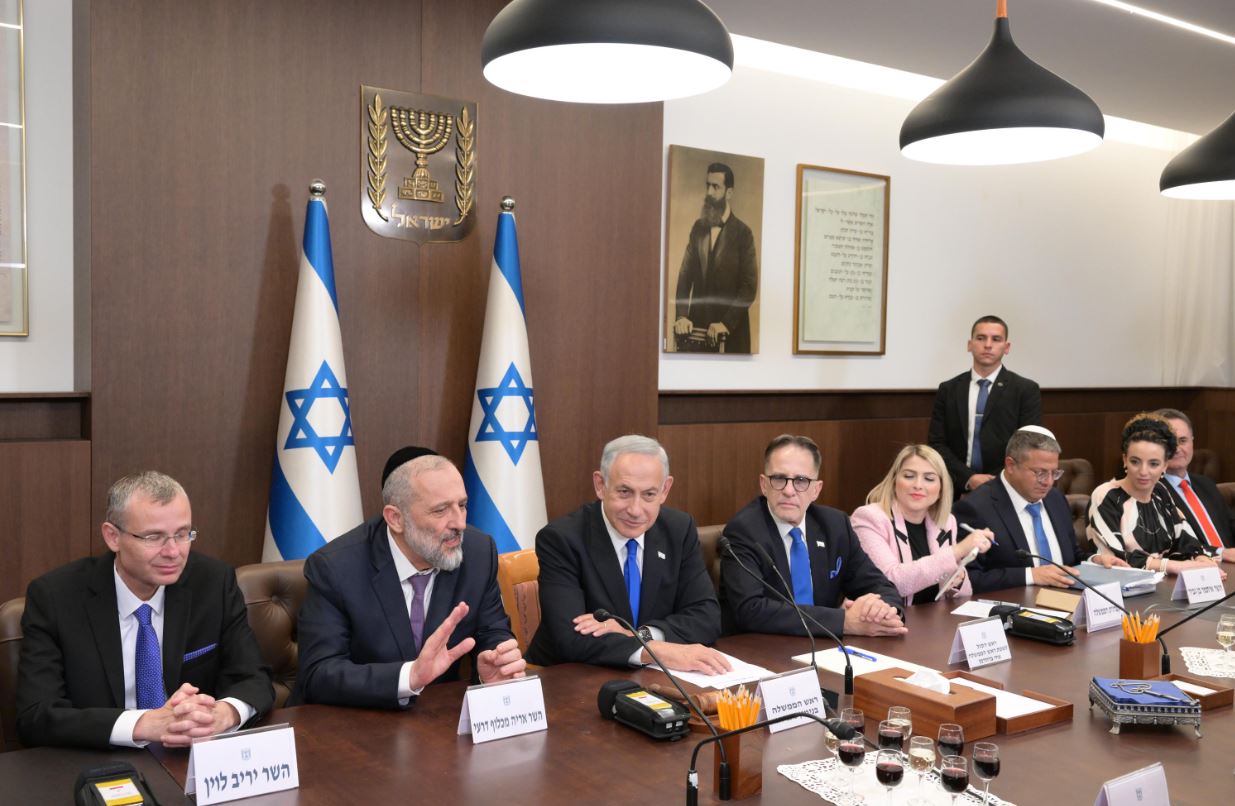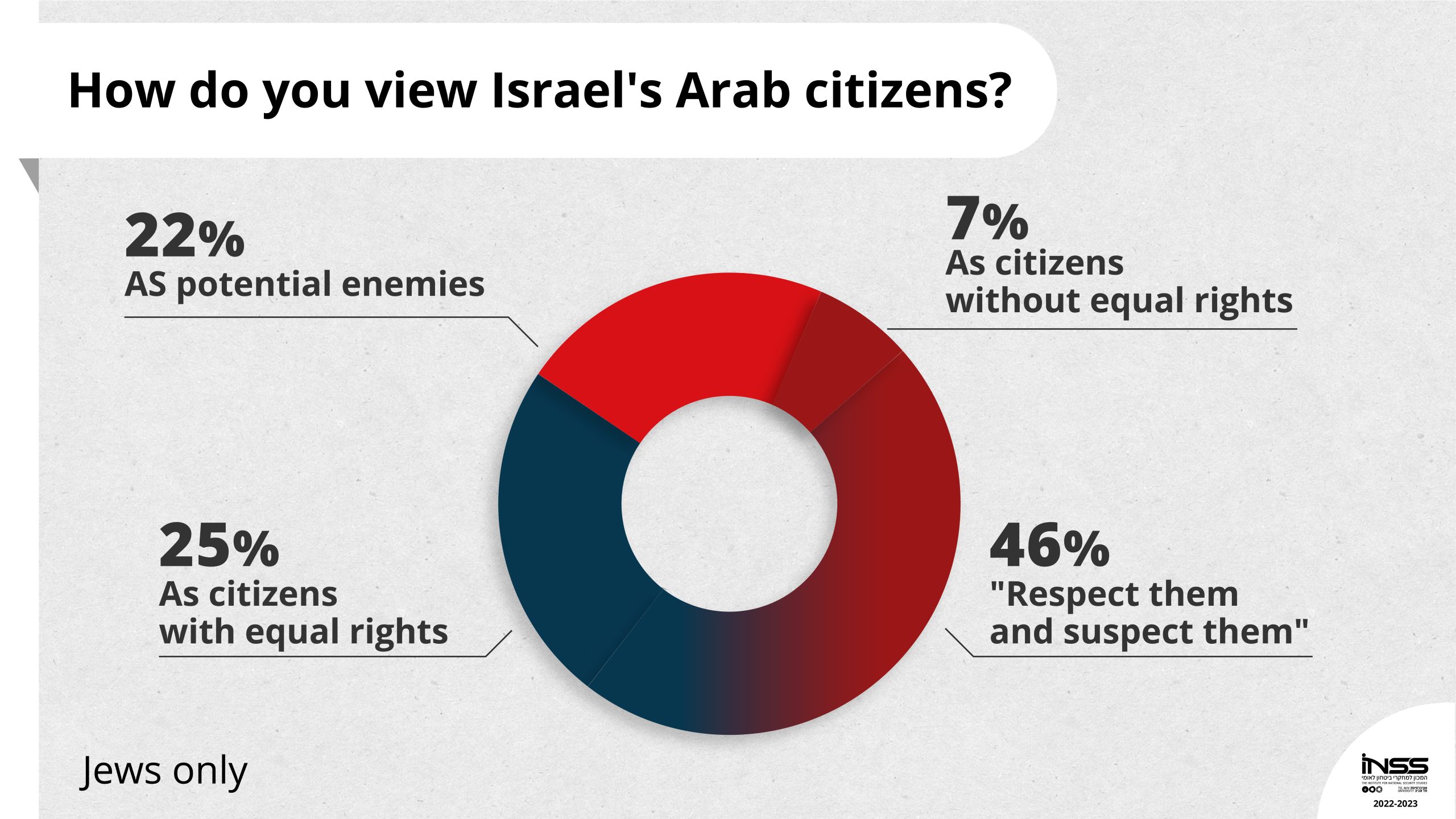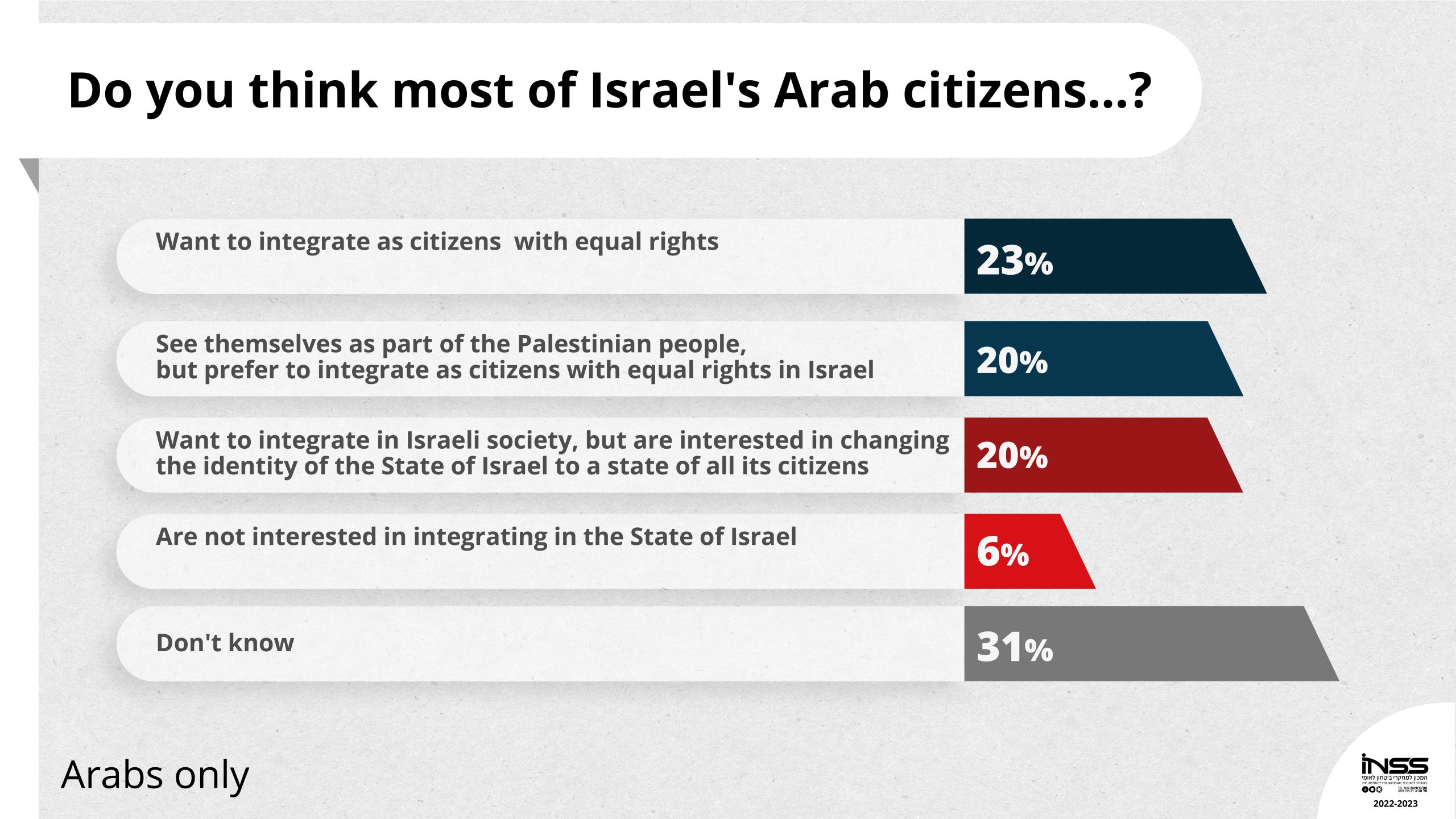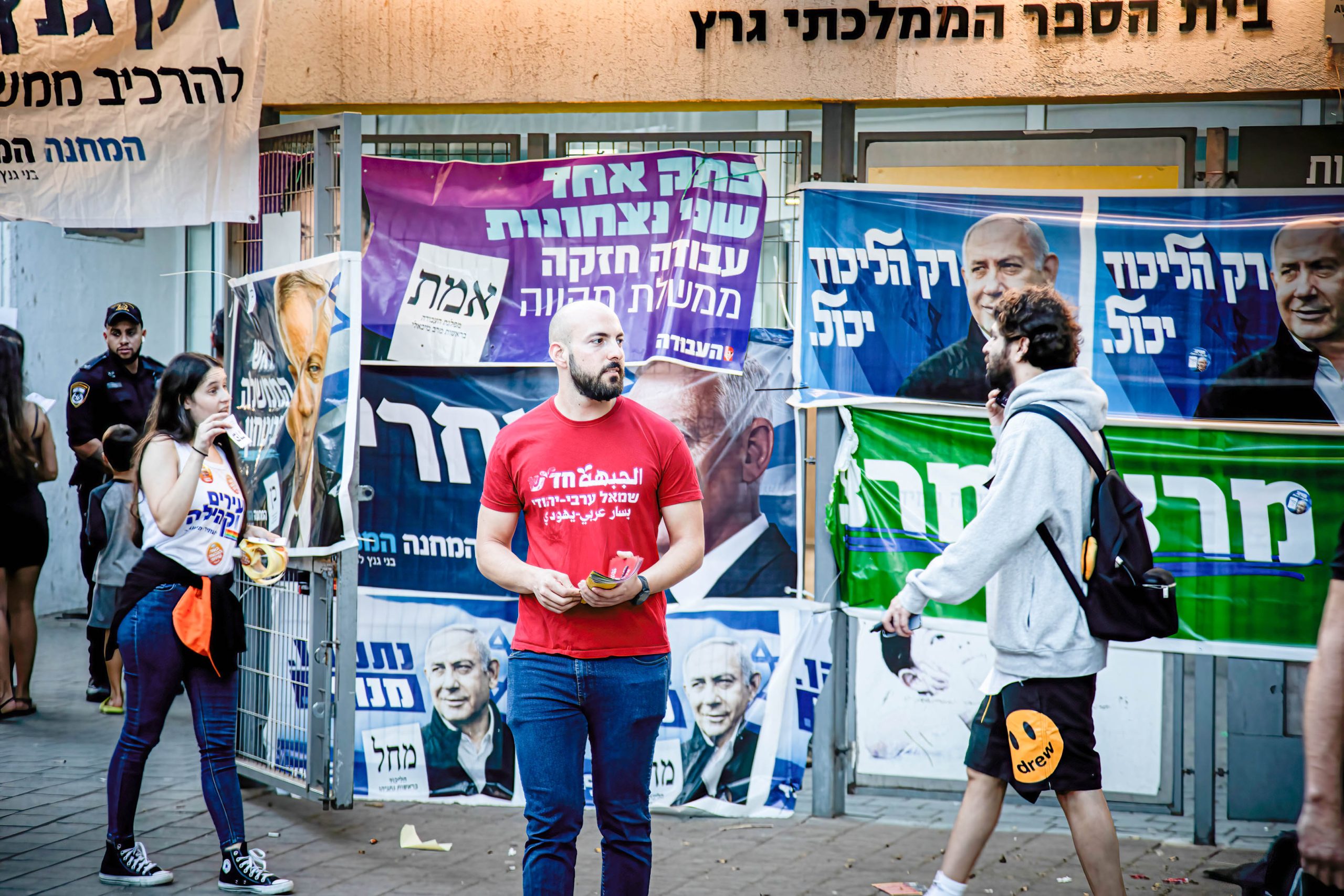Publications
INSS Insight No. 1693, March 6, 2023
Arab society in Israel is concerned about the outcome of the latest national elections and the current right wing government, and the possible repercussions for relations between the Arab minority on the one hand and the state and the Jewish majority on the other. Even if most Arab citizens are rather indifferent to Israeli politics, they seek to continue their integration in society; moreover, this trend represents a clear interest of the Arab sector, the Jewish majority, and the state. Arab public and political expressions and actions are now colored by tense anticipation: will the government’s constructive policy toward the Arab minority that Prime Minister Benjamin Netanyahu initiated in 2015 continue, or will it change for the worse? Meanwhile, the Arab public has adopted a pragmatic stance and largely avoided active involvement in the public protests against the government’s proposed overhaul of the judicial system. Thus far, the ongoing policy toward the Arab minority presents as reasonable and contributes to domestic stability, which has a positive impact on national security. It therefore behooves the government to maintain and further develop the policy of integration, especially by implementing in full the existing five-year plans for Arab society. In addition, political leaders should refrain from rhetoric that alienates and marginalizes the Arab public.
The establishment of Israel’s 37th government, which includes nationalist, religious, and ultra-Orthodox representatives considered hostile to Arabs and lacks Arab representation, in tandem with an approach evident in some of the coalition agreements and the proposed profound changes to the judicial system, have led Arab society and its leaders to conclude that they may face a major socio-political challenge.
Concerns of the Arab public about its status and future as a minority are aired in the social media, especially among the young (aged 20 to 35), most of whom are urban and educated. The discourse is quite anxious. There is real fear of discriminatory legislation against Arabs and concern that the personal and public rights of Arabs might be jeopardized. Some express an apprehension that the already unequal allocation of national resources will worsen, and that there will be a slowdown in the implementation of five-year plans to advance Arab society and fight crime; they are concerned that these resources will instead be allocated to projects in cities with mixed Arab and Jewish populations and to the Jewish sector. They are also concerned that Arab citizens will be denied equal services and that their freedom of expression in the public sphere will be curtailed – e.g., the right to display the Palestinian flag.
On the political level, Arabs fear a loss of government recognition of the legitimacy of the Arab voice and of any potential integration of Arabs in future government coalitions. There is growing concern about a ban on Arab political parties by defining them as “supporters of terrorism.” This fear is particularly acute given the severe security clashes with Palestinians in the West Bank and Jerusalem.

The Fabric of Life and the Development of Separatist Factions
A recent INSS survey showed that 63 percent of Arab respondents feel that the Israeli component of their identity is more important to them than the Palestinian element. Most respondents aspire to integrate into Israel’s society and the state. Some 80 percent of the Arab respondents support their political integration and the establishment of a government coalition that includes Arab political parties. At the same time, 61 percent of Arab respondents harbor a sense of alienation; they feel that Jews do not regard them as citizens with equal rights, and might even view them as potential enemies. The survey also shows that for the Arabs, the most pressing priority for the government is to reduce crime and violence in Arab society, as half of the Arab respondents suggest that their sense of personal security and safety has dropped in recent months.
In the same survey, about 73 percent of Israelis – both Jews and Arabs – advised the state to invest more in the wellbeing of Arab citizens. This should serve as an imperative for the new government, as unequal allocation of resources and institutionalized discrimination are liable to give impetus to separatism in Arab society and to increase the relatively small presence of radical factions in the Arab public.
At this stage, the new government’s policy toward Arab society is still unclear. Experience indicates that relations between Arab society and the state are dynamic, affected inter alia by policies that improve or harm its wellbeing and its integration in society and politics. It was a Netanyahu-led government that in December 2015 spearheaded and implemented a five-year plan for the advancement of Arab society with a budget of NIS 10 billion (approximately $3 billion), a policy that the subsequent Bennett-Lapid government greatly expanded in October 2021. Should this constructive policy be curtailed, the positive processes underway might recede and damage could be inflicted on the delicate social fabric between Arabs and Jews.

The Response to the Government's Judicial Overhaul
The Arab minority and its leaders are following the new government’s judicial overhaul with a tense wait-and-see attitude. Thus far, they have been hesitant to join the public protests. On the one hand, it is clear to them that the proposed judicial changes harm them and herefore it would be reasonable to join the protest. On the other hand, they realize that the public struggle centers on the preservation of Jewish democracy, which they believe excludes their sector. Arabs regard the demand by some protestors that Palestinian flags not be flown during the demonstrations as an attempt to erase their national identity.
MK Ayman Odeh, head of the Hadash Party, has called for an escalation in the struggle against the new government’s initiatives to be conducted at the popular, political, legal, parliamentary, and international levels. He views the Israeli-Palestinian conflict and the necessity of ending the occupation as part of the struggle for democracy and is willing to cooperate with Jewish left-wing and centrist political parties. MK Mansour Abbas, head of the United Arab List (Ra’am), suggests there is a general agreement in the Arab public against the government’s plans, and has offered to articulate a new strategy in the struggle against the judicial revolution to be led by civil society organizations, both Arab and Jewish, without the involvement of political parties.
Within Arab society, there are some voices calling on the Arab parties to appreciate the gravity of the moment and settle their internal conflicts, close ranks, and build a joint opposition with left-wing and centrist Jewish parties. At this point, it seems that such calls are unlikely to materializes.

Conclusion and Recommendations
Possible change to the state’s democratic nature is liable to lead to a worsening of relations with the Arab minority. Arab society, despite its indifference to the judicial overhaul, and Arab leaders are expressing serious concern about a possible exacerbation of the new government’s attitude toward them, and fear it will create an atmosphere of exclusion and marginalization. Over time, such grave developments might encourage radical trends, even separatism, within Arab society.
Therefore, policy recommendations for the government include:
- Avoid ethnic discrimination and legislative initiatives aimed at political and social exclusion, while ensuring equality in access to resources and opportunities in the labor market.
- Encourage integration of the Arab public, which represents about 20 percent of the general population, and relate to it as an equal partner.
- Avoid discriminating, inciting, and racist discourse, as well as questions regarding the Arabs’ loyalty to the state.
- Implement the five-year plans for the development and advancement of Arab society and the fight against violence and crime in collaboration with Arab leaders and representatives of Arab civil society.
These essential recommendations reflect a fundamental democratic commitment to all Israeli citizens. Adopting them will help improve relations between the Arab minority and the Jewish majority and dampen extremist elements in both publics. It will be helpful for viewing Israel as an enlightened democracy and enhance the nation’s status within the international community – most importantly, in the eyes of the US administration and Congress.



